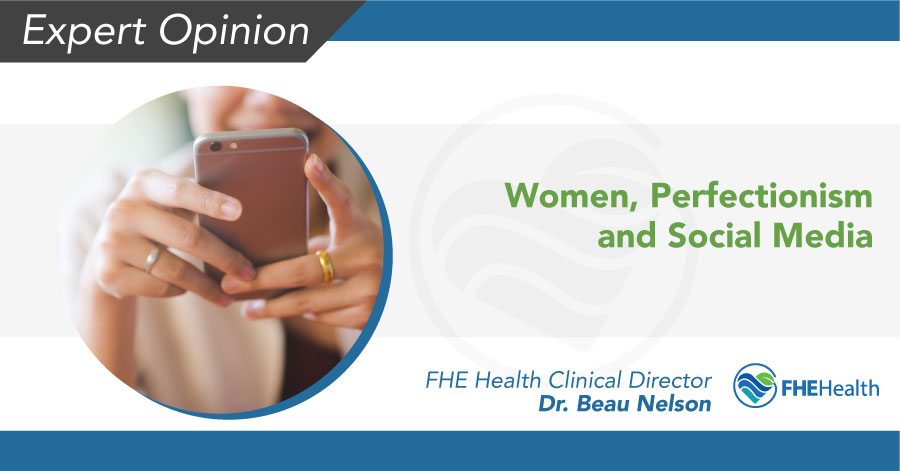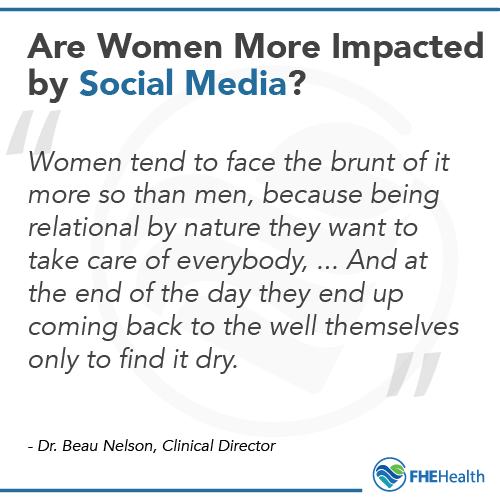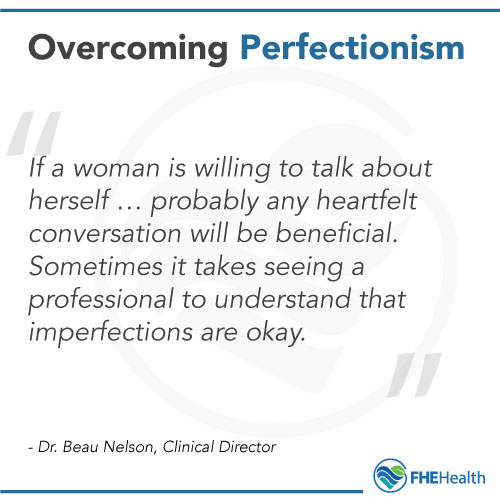
This article has been reviewed for accuracy by our peer review team which includes clinicians and medical professionals. Learn more about our peer review process.
When FHE Health Chief Clinical Officer Dr. Beau Nelson talks about women, perfectionism and social media, it quickly becomes apparent that he knows a thing or two about the topic, having dealt with it firsthand. Dr. Nelson has experience in the area of treating body image issues and eating disorders— conditions that disproportionately affect women and can be perpetuated by a culture of perfectionism fostered through social media. (90 percent of people with eating disorders are young women, in fact, according to the American Psychological Association.)
Treatment can begin quickly and discreetly, get started now Statistics also show that more women use social media than men. (Catch our own survey of the impact of social media on women, including social media selfies and body confidence.) With their endless stream of posts and images portraying thin, rich, happy and successful people, social media platforms like Facebook, Instagram and others have become for many women the bar for what they can and should be. More fit and attractive. More cultured and well-traveled. More successful. More powerful. Inevitably, no woman can fulfill all of these metrics for comparison, yet the constant barrage from social media can set anyone up for unhealthy standards, breeding perfectionism and anxiety, depression and other mental health conditions. On that note, what follow are Dr. Nelson’s insights regarding: Human beings are designed to live in small villages of 30 or 40 people. When you live in a village with 30 or 40 people, you pretty much look like everyone else and you’re unlikely to see an airbrushed model of perfection. The problem with social media is we’re now comparing ourselves to every super mom, fashion icon, business executive, etc., breeding a toxic environment of perfectionism, and that really changes the game. As further illustration, Dr. Nelson pointed to research on body dissatisfaction and attractiveness, which found substantially higher levels of body satisfaction among aboriginal tribes living in isolated regions of the world with no connection to the first world (and first-world gadgets like social media). In one study, men from these remote tribes were given various female body styles and asked to evaluate their attractiveness. Strikingly, all of the men picked women with curves and big hips rather than skinny, slight bodies. In contrast, “if you go to a man in New York City, [the ideal female body] is a sample size 0 or 2,” Dr. Nelson said, noting that “most women aren’t going to meet that.” Still, these artificialized conceptions of what’s beautiful and “perfect” have become widely accepted, common currency on social media. Women’s vulnerability to perfectionism as a result of social media and its messages cannot be explained by just one thing, according to Dr. Nelson. While the pressure to be perfect certainly can stem from social media, he situates this relationship within a larger context that includes “gender roles, work-life balance, conflicting obligations (work, caretaking, children, etc.) as well as managing stress, body issues, social norms.” “Women tend to face the brunt of it more so than men, because being relational by nature they want to take care of everybody,” Dr. Nelson said. “And at the end of the day they end up coming back to the well themselves only to find it dry.” Another factor that amplifies women’s vulnerability to social media-related perfectionism is how they’re socialized, starting in their teen years: “Women are socialized differently, so if they’re driven, outspoken, etc.—they can be stigmatized; whereas if a man is driven and outspoken they’re often viewed as charismatic and people like them.” The “early sexualization of young women is another trend” that can trigger unhealthy preoccupations with appearance within the female demographic, according to Dr. Nelson. By way of example, he noted the difference in compliments that society often pays to boys and girls. It can often be the case that a girl gets complimented for her looks, whereas a boy is recognized for something that has nothing to do with appearance. The implication? That a perfectionist is someone who is striving to be good enough in one or more facets of their life. But within a social media context, such striving is doomed to fail, “because if you’re always comparing yourself to others on social media, you’ll never be good enough— and even on your best day you’ll never be good enough.” Perfectionist tendencies can lead to anxiety, depression and/or other mental health problems if a social media user already has a predisposition for social anxiety, depression, etc. For example, “If someone has a predisposition for social anxiety, then when they see that everyone looks so perfect, etc., what happens is that most of the time they focus on those comparisons with others.” What they fail to register are the imperfections of others and “all the things people aren’t doing right.” A predisposition for mental health problems can thus compound the negative comparisons we make about ourselves in relation to others on social media. Ready to start? More questions about treatment? That said, there’s a direct correlation between social media use, perfectionism, and depression in women. How much time someone spends on social media can absolutely raise her chances of developing an anxiety or depressive disorder, according to research. The more time spent on social media platforms, the greater the chances of developing symptoms of anxiety and depression. Social anxiety is usually considered to be a normal part of adolescence. However, when that anxiety becomes chronic and extreme, seriously impairing one’s quality of life, a social anxiety disorder may be at play. As a teenaged girl (or anyone, for that matter!) spends more and more of their time on social media, she can get caught up in this virtual world to such a degree that other real-life relationships with family and friends suffer. “Technology stunts real, meaningful connections with people,” as Dr. Nelson put it. This pattern over time can give rise to serious social anxiety disorders that may require treatment. The goal of CBT is thus to help patients revisit and change unhealthy perspectives, so that they can feel better about themselves and develop healthier self-esteem. Dr. Nelson used a real-life example from CBT therapist David Burns’ book, 10 Days to Self-Esteem, to illustrate how CBT can help people develop healthier perspectives about themselves in relation to the world around them. As Dr. Nelson recounted it, Burns described a patient “who was deathly socially anxious and wouldn’t even go to the grocery store.” Why? “Because whenever it was time to head into line at the cash register, this man’s debilitating social anxiety would take over.” As a prescription for his social anxiety, this man was encouraged to go to the grocery store, stand near the front entrance and simply watch people check out. Over time, watching these many interactions at the grocery store “helped change his perspective.” He realized that mistakes were okay and that even social imperfection had its own rewards. As another anecdote, Dr. Nelson said he often prescribes to patients that they go to the mall and just observe couples and their body types. Whether it’s the overweight woman who is holding hands with her tall, built date or the gorgeous-looking model who is sitting all by herself looking forlorn, our commonly occurring assumptions that “perfection” wins the day often is proven false. Controlling and overcoming perfectionism in relation to social media is not easy, but exercises like the above can often be effective at changing an unhealthy perspective and/or improving self-esteem. Dr. Nelson also commended simple talk therapy as another helpful intervention for women who struggle with perfectionism in relation to social media messages and images. “If a woman is willing to talk about herself … probably any heartfelt conversation will be beneficial. Sometimes it takes seeing a professional to understand that imperfections are okay.” Moreover, for those who struggle with perfectionism, particularly from social media, Dr. Nelson recommends doing the very opposite— celebrating imperfection: There is a folklore story that was told to me and it goes like this: Amish women make beautiful quilts and are known for their pieces of art; when Amish women make a quilt, they sew one errant string onto the end to remind themselves that only God is perfect. Maybe the story is true. Maybe it’s not. That’s debatable— but the thought behind it is powerful.The idea is, “Can we celebrate imperfection?” Can we recognize in life that the best in life isn’t controlled or planned? Often the best things are because you didn’t have control. If you truly controlled these experiences, that would have squashed the enjoyment. Could this principle be a helpful corrective to how we approach social media and perfectionism? For avid female users with perfectionist tendencies— maybe. Kristina Robb-Dover is a content manager and writer with extensive editing and writing experience... read moreNeed Help?
The Link Between Social Media, Perfectionism and Other Negative Mental Health Effects
 Why is there a link between social media, perfectionism and negative effects on mental health, such as anxiety and depression? Here is how Dr. Nelson explained it:
Why is there a link between social media, perfectionism and negative effects on mental health, such as anxiety and depression? Here is how Dr. Nelson explained it:Why Women Are More Vulnerable to Perfectionism from Social Media Messages
Stress in Girls and Socialization of Women
Perfectionism, Anxiety and Depression – Is Perfectionism a Mental Illness?
 Perfectionism, heavily influenced by social media, often correlates with anxiety and depression. But perfectionism itself is not a mental illness. “Perfectionism is an unobtainable expectation,” Dr. Nelson said. Notably, too, perfectionism is not ultimately about achieving perfection; “it’s about being good enough.”
Perfectionism, heavily influenced by social media, often correlates with anxiety and depression. But perfectionism itself is not a mental illness. “Perfectionism is an unobtainable expectation,” Dr. Nelson said. Notably, too, perfectionism is not ultimately about achieving perfection; “it’s about being good enough.”How Perfectionism Can Cause Anxiety and Depression for Social Media Users
Begin your recovery today
How Does Social Media Relates to Depression
Social Anxiety Perfectionism in Teen Girls and Women
Therapies That Can Ease Social Anxiety, Perfectionism and Other Mental Health Problems
 Certain therapies are especially helpful for addressing perfectionism and other social media-related mental health symptoms. One such therapy is “cognitive behavioral therapy” (CBT). Dr. Nelson, who has certification in CBT, trained under Albert Ellis, the founder of a branch of CBT known as “rational emotive therapy.” The idea behind rational emotive therapy and CBT is this: “that the way people perceive things has a big impact on them;” and, “our thinking really impacts how we think and behave.”
Certain therapies are especially helpful for addressing perfectionism and other social media-related mental health symptoms. One such therapy is “cognitive behavioral therapy” (CBT). Dr. Nelson, who has certification in CBT, trained under Albert Ellis, the founder of a branch of CBT known as “rational emotive therapy.” The idea behind rational emotive therapy and CBT is this: “that the way people perceive things has a big impact on them;” and, “our thinking really impacts how we think and behave.”Controlling and Overcoming Perfectionism Through The Lens of Social Media
![]()
About Kristina Robb-Dover






